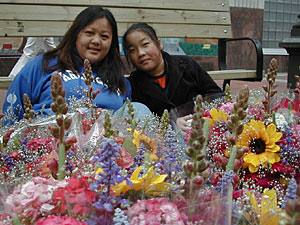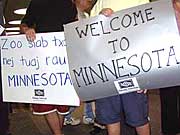| The Hmong in Minnesota |
|
Audio
Photos
More from MPR
Your Voice
|
Jobs for Hmong refugees a priority and a challenge
July 6, 2004
 |
| Yer Vang, left, and sister Samantha help sell vegetables and flowers from their brother's farm. Yer isn't sure if she has any relatives on the way from Thailand. She has heard many of the Hmong refugees "do garden a lot...and they know how to plant." (MPR Photo/Jeff Horwich) |
St. Paul, Minn. — Five-thousand Hmong could be coming to Minnesota, for a new life in some ways infinitely better than what they're leaving. They're trading refugee-camp-squalor for an American city; a state of limbo for one of opportunity.
But the Hmong are not arriving at the best of times.
 | |||
Minnesota's economy, slowly recovering, still has 24,000 fewer jobs than it had three years ago. And by all accounts, it will take a major effort to turn the refugees from job-wanters to job candidates.
In a classroom in St. Paul, immigrants from a previous wave get lessons in the Hmong language -- while waiting for their class in basic English to begin. Officials with the Hmong American Partnership, which sponsors this class, say they are preparing for many more refugees who are not literate in either language -- a challenge they say they have not really faced in 10 years.
Yao Lo, a job advisor with another St. Paul group, Lao Family Community, says when it comes to language and other job skills, age will be a major factor.
"Some young people, if they're healthy and they learn quickly, (in) maybe six months they've got a job," Lo says. "Old people who cannot speak English will take a lot of time to learn how to get a job."
The refugees have three months of federal financial support once they arrive. But Lo says they can afford about one week of settling-in time before starting the job hunt. This means securing transportation, learning how to communicate with an employer, and learning enough basic English to read warning and safety signs.
Lo is discouraged by the economy. But he is meeting with one company that may want 40 basic assembly workers. And he's got a line on another company looking for workers who can sew.
 | |||
Then there's farming. Yer Vang and her two sisters, Samantha and Yu, are among the many Hmong filling plastic bags with potatoes, peas and flowers at a downtown St. Paul farmers' market.
She doesn't know much about the refugees, but she does know this: "In Thailand a lot of them do garden a lot, so they're used to it, and they know how to plant," she says.
New arrivals are unlikely to field the $30,000 down-payment for a 10-acre farming plot. But they may be folded into expanded farming operations of relatives already here. The work doesn't require much English, and large families supply abundant free labor.
Gregg Bongard extends loans to Hmong farmers through the 1st United Bank in Faribault, the kind of community south and east of the Twin Cities where such farms are appearing.
"I think there's a lot of room for new entrants," Bongard says. "Maybe not selling through farmers' markets, but maybe selling direct to stores and restaurants, that kind of thing."
Bongard says new or expanding Hmong farms can access many state and federal loan programs -- some of them currently underutilized.
 | |||
A few refugees may be able to leapfrog jobs involving dirt or monotonous assembly work. Adam Buhr, development director of the Hmong American Partnership, says there's something promising about many young people who will be arriving.
"These will fortunately have more familiarity with technology than some earlier refugees," Buhr says. "Many in the camps have cell-phones. There are computers in the camp for sure."
Buhr is present at graduation day at the Partnership's computer skills class, where some new Hmong might come to prepare for office jobs. In nine weeks the class covered resumes and spreadsheets. They've been through mock-job interviews.
Mai Yang beams her life and goals onto the wall as a PowerPoint presentation -- a final project. Yang immigrated in 1989. She knows the refugees on the way, even those with a technical head-start, have a long road ahead.
"It's going to be tough," she says. "I know how they would feel, because I've been there in their shoes before. It's going to be very hard."
Not that "hard" is likely to faze the refugees. After all, this group has faced challenges before. Finding a job will simply be the latest one.
|
News Headlines
|
Related Subjects
|

